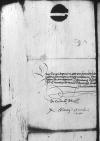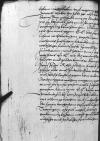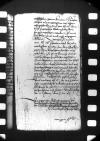Letter #4984
Albrecht I von Hohenzollern-Ansbach to Ioannes DANTISCUS & Tiedemann GIESEKönigsberg (Królewiec), 1540-03-07
| received Schmolainen (Smolajny), 1540-03-10 Manuscript sources:
Auxiliary sources:
Prints:
| ||||||||||||
Text & apparatus & commentary Plain text Text & commentary Text & apparatus
Denn erwirdigenn in Goth unnsernn besunder[...] hidden by binding⌈[...][...] hidden by binding⌉ liebenn freundenn unnd nachbarnn herrnn hidden by binding⌈[n]n hidden by binding⌉
Unnser freuntlich dinnst unnd was wir liebs unnd guts vormogenn zuvornn.
Erwirdige in Goth, / besonndere liebe freundt und nachtbare.
Wir habenn aus E(uer) L(ieb) semptlichenn cf.  BCz, 1606, p. 366 bestenn / nachpliebenn vast ungernn gehe[...] hidden by binding⌈[...][...] hidden by binding⌉.
BCz, 1606, p. 366 bestenn / nachpliebenn vast ungernn gehe[...] hidden by binding⌈[...][...] hidden by binding⌉.
Dieweill es aber der liebe Got also unn[...] hidden by binding⌈[...][...] hidden by binding⌉ dermassenn geschickt mus es demselben hidden by binding⌈[en]en hidden by binding⌉ pis in bequemer zeit unnd seiner guethen hidden by binding⌈[then]then hidden by binding⌉ vorfuegung bevolhenn sein. / Allaint wir thun unns gegenn E(uer) L(ieb) des freuntlichenn nachtbarlichenn erpietlichenn willenns hochlichenn bedanckenn inn wolthetiger freuntschafft hinwidder zuvordienenn, / unnd hettenn unnsers erachtens E(uer) L(ieb) als die vornembsten haupter unnd glieder berurter  BCz, 1606, p. 367 mitheÿlenn hettenn konnenn. /
BCz, 1606, p. 367 mitheÿlenn hettenn konnenn. /
Nachdem es denn aus angeregtenn ursachenn also entstandenn unnd vonn E(uer) L(ieb) denn brief ungeoffent bleibenn zulassenn fur gut angesehenn wordenn, / ist unns dasselbig auch mit unnd nicht entgegenn allaint. /
Wiewoll zu unserm ann E(uer) L(ieb) schreibenn, vast die notwendigstenn puncten inn denn schrifften gegen denn koniglichenn stendenn auss gedruckt, / so ist es dannocht etwas weitleufftiger in söllichem angetzogenn. / Hirumb wöllenn wir nochmals inn E(uer) L(ieb) vilbemeltenn briff zuerbrechen, / und uns ir getrewhertzigs wolmeynend bedencken darauf zuerkennen zugebenn, / oder aber pis auf nechste zusam(m)ennkunfft beruehen zulassenn, / wolgefallen gestelt haben. Unnd woltenn E(uer) L(ieb) (der wir zu freuntlicher nachbarschafft und allem guten gneigt) sollichs auf ir schreibenn in antwort hinwidder im bestenn nicht bergenn. /
Dat(um)
Von Gots gnaden



